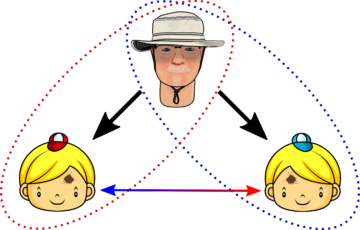by Jochen Szangolies

In last month’s column, I argued for the notion that life does not neatly decompose into individual life-forms—fish, fungi, firs, and humans. Instead, we are all just part of the same life expressed in many bodies, the way the one life of the butterfly is expressed in the two bodies of the larva (the caterpillar) and the imago (the winged form we typically think of when talking about butterflies). The argument wasn’t intended to foster some kind of hand-holding-moment of ‘we’re all in this together’ (not just, at least), but instead, was meant to chip away at what I believe to be two of the greatest obstacles towards meaningful collective action in the face of global existential crisis: locality of concern and despair of scale.
By locality of concern, I don’t merely mean being of the opinion that everything revolves around one’s own particular affairs—although that may be an expression of it. Rather, I mean the notion that one’s reasons for action are mostly or wholly centered on one’s own experience within the world—and may thus be in opposition to that of others. The idea that we’re all part of the same life contravenes this, by for instance making harm to ‘other’ life a form of self-harm—something that’s not just morally wrong, as most might agree it is, but simply irrational, like cutting off a perfectly functional thumb—like the caterpillar trying to get back at the butterfly because it envies its ability to fly.
But I believe that the other factor, despair of scale, may be yet more damaging, and it is this that I’ll be concerned with here.
The root of such despair is the realization of one’s own insignificance in the face of threats of a global magnitude—faced with such events, it is easy to believe oneself to be little more than a grain of sand, swept away by the tides of history. It is this despair that I believe is responsible for a disturbing recent change in public attitude towards global warming: climate change denial seems to abate, only to be supplanted with climate change defeatism—a narrative that it’s too late anyway. Both can be used to justify a lack of action, but the latter can also paint itself as more enlightened than the blinkered view of ‘alarmists’ who haven’t yet understood that there’s nothing left to do.
The truly pernicious element of such despair is that it is self-reinforcing: I won’t act if I can’t overcome my despair; and if I don’t act, I shouldn’t expect others to; but then, I should despair, because in the absence of collective action, we truly are lost. Hence, I don’t act, and the object of my despair comes that much closer to being realized. Without this calculus of despair, we might have acted; but because it is there, we don’t, and hence, such despair supplies the conditions of its own fulfillment.
We must thus find a way to combat this despair. I argue that the key is the realization that the proper way to contextualize the struggle against existential threats is not in terms of each individual in a lonesome fight they cannot hope to win, but rather, in terms of action on a collective scale, which can achieve ends that seem hopelessly infeasible from the frog’s eye view of the individual. But before we can get to this point, there are some obstacles and challenges we must overcome.
Paradoxes Of Collective Action
A single mackerel in open water, faced with a hungry shark, will stand scant chances of survival. It probably can’t escape, and it certainly can’t fight back; its only option might be to hide and hope, so if there’s no place left to hide, it’s snacking time. Therefore, mackerels form schools: large groups of individuals that act in unison. This carries several advantages: predators can be spotted earlier, an attacker may have greater trouble singling out individual targets and become confused, and the chances for each particular member of the school to become shark dinner are diluted. This seems to make a straightforward case for collective action.
However, things are not so simple. The protection offered by schooling works only as long as individual members can count on others to play ball—to cooperate, rather than defect, in game-theoretic terms. If a mackerel were to suspect that, upon being attacked, the others would simply desert it, it should itself seek refuge in flight. Furthermore, in the swarm, there is still a certain chance to meet the shark’s jaws; so, an individual mackerel might well reason (if mackerels could reason) that it can improve its chances by quietly sneaking away from the school, as long as its bulk has captured the attention of the shark. However, it should then expect the other mackerels to reach the same conclusion. But if they all do, then it follows that this strategy doesn’t pay off, after all—and hence, the outcome will be worse for the mackerels, on average. Consequently, acting as a swarm is beneficial for all mackerels, but for each individual mackerel, defecting from the swarm may be a more profitable option.

This has the form of the well-known Tragedy of the Commons. When benefits of a strategy go to the individual, while costs are shared by the group, it can be entirely rational for the individual to act in ways that ultimately hurt the collective—and thus, themselves. There are various ways to hem in such deleterious effects. One possibility is to instill government-mandated rules regulating the use of resources, say. But such top-down measures are unsuitable to global-scale action: there is nobody at the top.
The other option is to work from the bottom up, for instance, by establishing shared norms and other social schemes. But there remains the problem of how we could know that others will play ball: if they defect, while we choose to cooperate, we are at a greater disadvantage than even in the situation where all exploit resources freely, as we restrain ourselves from the use of resources now free to those who break the social contract, thus leaving us with even less. Hence, we must, in some way, be able to establish trust that others will act faithfully. With this, the problem of collective action is transformed to one of common knowledge: every member of a group must know how others will act to rationally formulate their own plan of action.
A Swarm Of Muddy Foreheads
Common knowledge is a powerful notion, but it can be a little counterintuitive at first. Knowledge is common if, when you know something, I know that you know it, and you know that I know that you know it, and I know that… And so on. To illustrate the power of common knowledge, take the following little tale, known as the muddy forehead puzzle, which stands as one of the most surprising and striking logic puzzles ever devised.
Three children (who are, as usually in these tales, also perfect logicians, so well, maybe not your typical kids) have been playing in the park, such that they all have gotten some mud on their foreheads. Their father comes along and says, ‘if you have mud on your forehead, stand up and go clean yourself’. Naturally, neither child stands up: while they can see that the other children have muddy foreheads, that doesn’t tell them anything about the state of their own.
Again, the father asks, ‘knowing that nobody stood up last time, if you now know you have mud on your forehead, stand up and go clean yourself’. And again, nobody stands up—naturally. Now, the father tries something different, and says: ‘I hereby announce that at least one of you has a muddy forehead.’ At first glance, this doesn’t tell them anything new—after all, each of them already knew that, because they could see the other’s foreheads. So, the father again says, ‘if you know you have a muddy forehead, stand up and go clean yourself’. Nobody does so. He asks a second time, with the same result. However, on the third time, all three children get up and go to wash their faces.
What’s happened here? The solution is that the father’s announcement that there is at least one child with a muddy forehead has transformed this fact from something that each child knew individually to something that each child knows the other children know, as well—and each child knows the other children know it knows, and so on: it has been made into an element of common knowledge.

Suppose there are only two children, Alice and Bob: each sees the other has a muddy forehead, but doesn’t know whether the other also sees a muddy forehead. So when the father asks them to stand up, neither does—Alice sees Bob’s muddy forehead, but doesn’t know what Bob sees. Further questions don’t change that.
But now, if both Alice and Bob know that at least one of them has a muddy forehead, when Alice sees the mud on Bob’s forehead, and Bob fails to get up after the first question, Alice knows that Bob must see a muddy forehead—hers. Otherwise, Bob, seeing Alice’s forehead mud-free, would’ve gotten up after the first round. Consequently, with Bob reasoning identically, both stand up when the question is asked the second time.
Then, it is only a matter of induction to generalize this to greater numbers of children: we start out with the common knowledge that at least one child has a muddy forehead. If, after the first round, no child stands up, it must be the case that at least two children have muddy foreheads, and this fact becomes common knowledge. If nobody then stands up in the second round, it becomes common knowledge that at least three children have muddy foreheads. And so on.
Consequently, common knowledge can enable collective action in a way irreducible to knowledge located with the individuals alone. In order for the mackerels to obey the school’s rules, then, we ought to find a way to make the adherence of each individual to these rules, which is only known to that individual, common knowledge, thus enabling collective action. But establishing common knowledge is difficult, as another tale will make clear.
Suppose that two thieves are preparing a heist on a high-value target, in such a way that their scheme can only be successful if both act simultaneously, otherwise risking capture by law enforcement. Therefore, it is essential to coordinate their action. However, they can’t risk to directly contact one another, as this might draw unwanted police attention. So suppose that thief A sends a message to thief B, with the message ‘Carry out the plan at 02:00 am!’. If thief B receives the message, all is well, and the heist goes as planned. But thief A can’t be sure that thief B actually has received the message—whatever lines of communication are used might be susceptible to outside interference, the police intercepting any messenger or blocking mail. Therefore, they can’t be sure that thief B will, indeed, go forward with the plan, and might conclude it best to play it safe.

Knowing this, thief B might send their own message, acknowledging reception of A’s and indicating willingness to go through as planned. But this doesn’t help matters: now thief B doesn’t know whether their message got through, and thus, doesn’t know whether A’s doubts have been allayed, and consequently, doesn’t know whether thief A will indeed carry on according to plan—and might choose to stay home, to be safe! This problem iterates: no matter how many messages are sent out, neither side can be sure whether the other will, in fact, carry out their part of the plan. (This is a variant of the Coordinated Attack Problem, in which two armies need to attack a city simultaneously to guarantee success; I have chosen this variation in light of current events.)
In the case of the muddy foreheads, the children’s father acted as a common source of truth: with every child knowing that all other children are in contact with this source, all truth originating with it automatically becomes common knowledge. The thieveslack a common source of truth, and can never establish one for themselves. Hence, overcoming the problems of collective action necessitates finding a common source of truth.
The only problem is, of course, that no such common source exists, or could exist—and everyone who claims differently should be viewed with great suspicion, for those who try to mandate truth all too often do so by burning books that dare to differ. No oracle, no prophet, no scientist can play the role of ultimate source of truth.
So what do we do, in the absence of truth? Has all of this been just a wild goose chase? I don’t believe so; rather, I think there is something that we can use as a substitute for this source of truth that doesn’t, and can’t, claim absolutist validity, but that repays our trust in it with shaping the preconditions necessary for its promise to become realized, and in this, is the antithesis of despair of scale: a notion that’s had a lot of bad press in recent times, namely, the idea of faith.
Blessed Are Those Who Have Not Yet Seen
The Will To Believe is the title of an 1896 lecture by William James, an American pragmatist philosopher and pioneer of psychology. In it, he offers arguments for a surprising thesis: that sometimes, the evidence for the truth of a given thesis, and thus, for the rationality of believing in it, only becomes accessible upon accepting it on faith. That is, we need to engage in an unjustified leap of belief in order to avail ourselves of those facts and results that retroactively allow us to justify taking this leap in the first place.
This is not as strange an idea as it may initially appear. Sometimes, the success of a certain endeavor—asking somebody out on a date, giving a presentation in front of a difficult audience—may require confidence. That is, to reasonably expect that your presentation will go well, you need to be confident in your ability to connect with the audience; but this confidence is essentially unjustified, for without it, you might not be able to do so. But assuming this stance of ‘misplaced confidence’ then allows you to indeed succeed—thus retroactively justifying your initial confidence.
Likewise, the establishment of a relationship—of the romantic or platonic kind—often requires a certain kind of investment of trust: if one is so scared of being rejected that one doesn’t dare showing signs of interest in another, one might be perceived as aloof, and be viewed as less likable, while approaching another on the assumption that one’s interest is reciprocated might be viewed as warm and personable, hence more likable. We pay each other an advance of trust in order to form bonds between one another.
With this, James argues for the following thesis: ‘In truths dependent on our personal action, then, faith based on desire is certainly a lawful and possibly an indispensable thing.’ In terms of the problem of collective action, we want to believe that our own actions, as part of a collective movement, will be matched by others; but since our acting in this way impels others to act likewise, this belief, this act of faith, is retroactively justified.
The mackerel, then, does not need to know in advance whether the rest of the school will play by the rules; it can trust that if it does so, then others are likely to reciprocate, and thus, counter the calculus of utility that would see it defect with James’ will to believe as a replacement for a source of absolute truth.
It is then faith that I believe is ultimately the only final justification for—and only path to overcoming the paradoxes of—collective action. Faith not in God or gods, but faith that in the absence of a single source of common truth it is our shared communal nature, our partaking in the single, unified life, that can foster the means of its own justification by being rewarded through others joining us in our efforts. If this is understood, we have no grounds for despair of scale, but pay, in our actions and efforts to preserve our world, others an advance of trust that we are justified to expect seeing repaid. We may believe, because the fact of our belief makes it rational to expect that others believe, too; but if we all believe, we all act, and in that, our belief is justified.
Collective action is often given a negative justification: a vote not submitted is a vote for the other party. But the above adds a positive dimension to acting individually as one would wish for the collective to act: it is an expression of your faith in your community, and only through this expression does this faith become justified. This is why it makes sense to vote, even if your vote alone matters little. It’s why it makes sense to march for peace, even if your voice won’t be heard. It’s why it makes sense to recycle, to walk rather than drive, to act in an ecologically conscious way—but most importantly, it’s why it makes sense not to despair.
